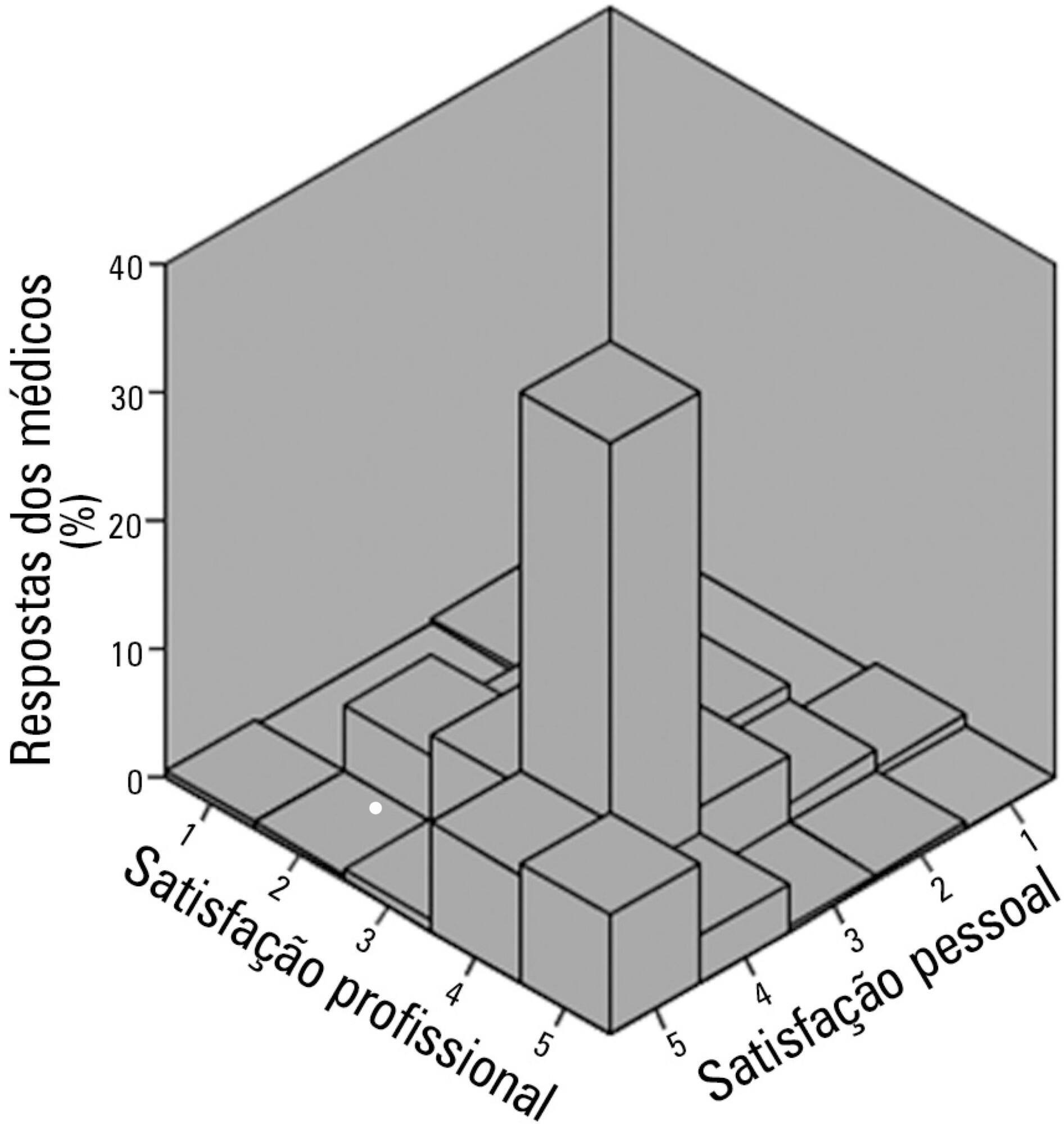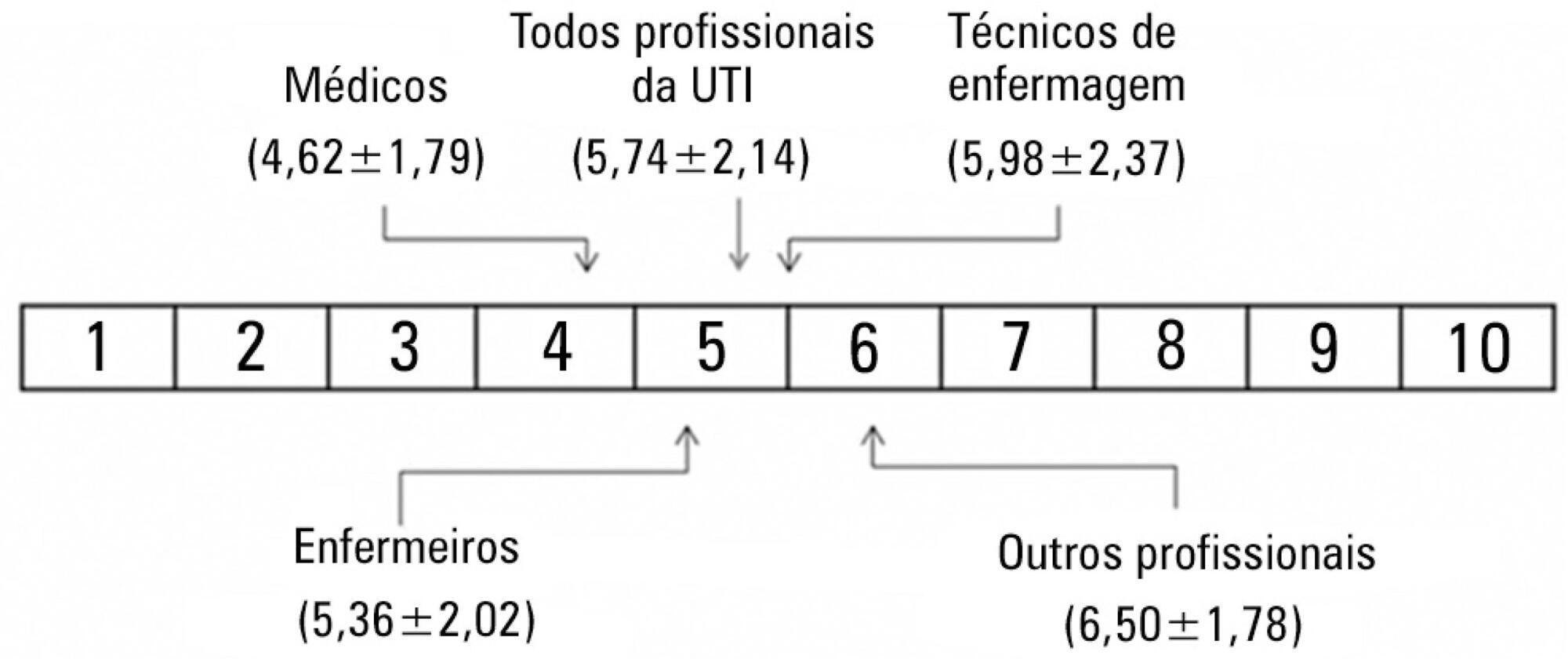Abstract
Rev Bras Ter Intensiva. 2016;28(2):107-113
DOI 10.5935/0103-507X.20160024
To evaluate job and personal satisfaction rates in physicians who work in adult intensive care units and to identify the factors associated with satisfaction.
A cross-sectional study performed with physicians who participated in two intensive medicine online discussion groups. A questionnaire designed to assess the physician's sociodemographic profile and job was available for both groups for 3 months. At the end of the questionnaire, the participants addressed their degrees of job and personal satisfaction using a Likert scale in which 1 represented "very dissatisfied" and 5 represented "very satisfied". The association between sociodemographic and job characteristics with job and personal satisfaction was evaluated. Variables independently associated with satisfaction were identified using a logistic regression model.
The questionnaire was answered by 250 physicians, of which 137 (54.8%) declared they were satisfied with their jobs and 34 (13.5%) were very satisfied. None of the evaluated characteristics were independently associated with job satisfaction. Regarding personal satisfaction, 136 (54.4%) physicians reported being satisfied, and 48 (19.9%) reported being very satisfied. Job satisfaction (OR = 7.21; 95%CI 3.21 - 16.20) and working in a university hospital (OR = 3.24; 95%CI 1.29 - 8.15) were factors independently associated with the personal satisfaction of the participants.
The participant physicians reported job and personal satisfaction with their work in intensive care. Job satisfaction and working in a university hospital were independently associated with greater personal satisfaction.

Abstract
Rev Bras Ter Intensiva. 2014;26(1):1-6
DOI 10.5935/0103-507X.20140001
To evaluate the satisfaction of the intensive care unit staff with a computerized physician order entry and to compare the concept of the computerized physician order entry relevance among intensive care unit healthcare workers.
We performed a cross-sectional survey to assess the satisfaction of the intensive care unit staff with the computerized physician order entry in a 30-bed medical/surgical adult intensive care unit using a self-administered questionnaire. The questions used for grading satisfaction levels were answered according to a numerical scale that ranged from 1 point (low satisfaction) to 10 points (high satisfaction).
The majority of the respondents (n=250) were female (66%) between the ages of 30 and 35 years of age (69%). The overall satisfaction with the computerized physician order entry scored 5.74±2.14 points. The satisfaction was lower among physicians (n=42) than among nurses, nurse technicians, respiratory therapists, clinical pharmacists and diet specialists (4.62±1.79 versus 5.97±2.14, p<0.001); satisfaction decreased with age (p<0.001). Physicians scored lower concerning the potential of the computerized physician order entry for improving patient safety (5.45±2.20 versus 8.09±2.21, p<0.001) and the ease of using the computerized physician order entry (3.83±1.88 versus 6.44±2.31, p<0.001). The characteristics independently associated with satisfaction were the system's user-friendliness, accuracy, capacity to provide clear information, and fast response time.
Six months after its implementation, healthcare workers were satisfied, albeit not entirely, with the computerized physician order entry. The overall users' satisfaction with computerized physician order entry was lower among physicians compared to other healthcare professionals. The factors associated with satisfaction included the belief that digitalization decreased the workload and contributed to the intensive care unit quality with a user-friendly and accurate system and that digitalization provided concise information within a reasonable time frame.

Abstract
Rev Bras Ter Intensiva. 2009;21(3):299-305
DOI 10.1590/S0103-507X2009000300010
OBJECTIVE: To investigate the relationship between work and quality of life of doctors and nurses in pediatric intensive care units and neonatal. METHODS: Cross-sectional study with 37 doctors and 20 nurses. The Job Content Questionnarie (JCQ) e Effort-Reward Imbalance (ERI), and World Health Organization Quality of Life (WHOQOL-100) were used. The correlation was estimated by Spearman correlation coefficient. RESULTS: The effort is inversely correlated with the areas physical, psychological, level of independence, environment (p<0.01) and social relationship (p<0.05). The reward is inversely correlated with the areas and psychological (p<0.05) level of independence (p<0.01). Control over the work is directly correlated with the physical domain (p<0.05). The psychological demands are inversely correlated with the areas physical (p<0.05), psychological (p<0.01) and level of independence (p<0.01). The physical demand is inversely correlated with physical areas, level of independence, environmental (p<0.01) and psychological (p<0.05). Job insecurity is inversely correlated with the psychological fields, level of independence (p<0.05) and the environment (p<0.01). Support the supervisor is directly correlated with degree of independence (p <0.05). CONCLUSION: Doctors and nurses showed high efforts, demands psychological, physical and job insecurity that impact on quality of life.